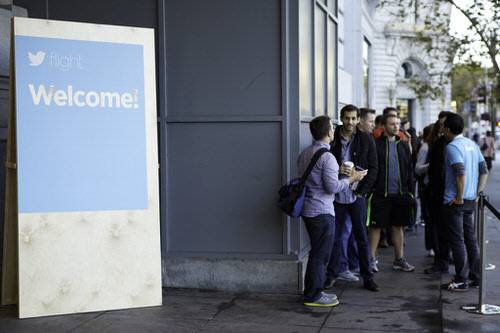
Twitter’s new suite of developers tools includes a simple login option which allows people to sign up for apps and services with only a phone number—no email required.
Digits is a free option offered as part of Fabric, three-part developers kit introduced Wednesday at the Twitter Flight developer’s conference in San Francisco. With Digits, Twitter is taking an identity more personal than perhaps our email or Twitter handles to login to apps—our phone numbers.
People simply put in their phone number to receive a confirmation code, and it works with anyone in almost any country, thanks to availability in 216 countries at launch.
Digits also allows people to interact with applications and services without downloading an app in the first place. McDonalds is one of Twitter’s early Fabric partners, and uses Digits to let customers take advantage of offers in McDonalds’ apps without downloading an application. When someone receives an offer from a friend with a McDonalds app via a text message, it can be redeemed by entering a phone number in the browser window.
Because Digits is fully white-labelled, it won’t even look like a Twitter product, rather the sign in button can be skinned to the design of the maker’s app.
Why Rely On Phone Numbers?
It’s a logical choice for Twitter, which began as an SMS platform. But why would anyone choose to give apps their phone number over an email or social login?
In many parts of the world, some people don’t have access to an email address, but always have a mobile number, Jeff Seibert, director of product for Twitter Fabric said during the Flight Keynote. Additionally, trying to juggle or maintain different logins for a variety of apps can be time-consuming, and people might not want to sign in to a professional app with a personal social account. Remembering passwords can be complicated, too, and by using a phone number, a password is not required.
But it also poses an interesting risk—distributing phone numbers to applications is yet another information leak waiting to happen.
Snapchat knows firsthand what can happen when a malicious hacker gains access to users’ phone numbers. In January, the social company was hit with a group of anonymous hackers compromised 4.6 million Snapchat accounts and posted users’ numbers online, with the last two digits blocked out.
People can create fake social usernames or dummy email addresses that don’t compromise personal information if leaked on the Internet. A phone number, on the other hand, requires the real thing. And it’s likely tied to other personal information, like your workplace or home address.
Phone Numbers Are Stronger Social Identities
As Twitter points out, social identities are fractured. Where once Facebook and Google were the two biggest platforms, other communication tools like WhatsApp, Snapchat and even Secret have begun to take over our phones.
Most of those services don’t provide a social login for third-party apps—but what they all have in common is that they use phone numbers to verify identities.
People might jump from social app to social app, but chances are, their phone number is sticking with them through device upgrades, the rise and fall of popular applications.
Digits makes it easy for other apps and services to adopt this login option, without spamming user social media pages for promotions. And if the only account required for downloading your application is a phone number, app developers can allow almost anyone in the world with a mobile device to use their apps.
The phone number may be the only social identity anyone needs.
Story photo courtesy of Twitter. Cover photo by Anthony Quintano.
















